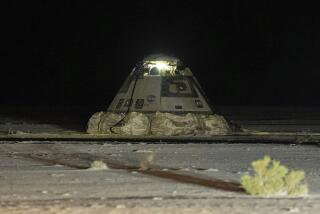Will Use Shuttle to Put Probe in Orbit : NASA Drops Unmanned Launch of Mars Observer
- Share via
WASHINGTON — The National Aeronautics and Space Administration on Friday decided against buying an unmanned rocket for a 1990 launch of its Mars Observer spacecraft, disappointing scientists who had hoped to see the schedule advanced to enliven the U.S. space program.
Under pressure from the Planetary Society and other scientific groups, NASA had considered spending about $130 million for an Air Force Titan rocket to launch the spacecraft in 1990 rather than leaving it in line for a launch aboard the space shuttle in 1992.
“The agency has retained a 1992 launch date as the current program base line,” NASA said in a three-sentence announcement Friday.
Agency Pay Hike Cited
A NASA official, who declined to be identified, said the much-debated decision was forced on the agency by its budgetary limitations, heavy spending associated with the recovery from last year’s Challenger explosion and a pay increase for space agency employees.
“It was a long shot, at best,” said one official who had supported the plan to remove the Mars Observer from the shuttle’s 1992 schedule and launch it with an Air Force booster. The Observer is one of four spacecraft awaiting launch when the shuttle returns to operation.
The first launch of the shuttle is scheduled for February, 1988, and the first of the planetary missions directed by Caltech’s Jet Propulsion Laboratory is set for launch in late 1989.
NASA officials still have not decided whether the first planetary mission will be the European Space Agency’s Ulysses mission past Jupiter and into a polar orbit around the sun or the U.S. Galileo flight to study Jupiter and its asteroids.
Both were set for launch in the spring of 1986 when the Challenger accident brought the U.S. space program to a standstill.
$127 Million More in Costs
Although the decision to keep the Mars Observer aboard the shuttle for 1992 rather than launching it earlier on an unmanned rocket was made for financial reasons, sources said the later launch will cost the program an additional $127 million.
Louis Friedman, executive director of the Planetary Society, said indications had been NASA was pressing to get an unmanned rocket for the earlier launch.
In a setback in its testing program of the shuttle’s modified solid booster rockets, NASA also said Friday that a late March firing of an engineering test motor is being postponed until mid-May.
A test on Feb. 23 turned up potential problems with the bonding of insulation in the motor, requiring additional work.
The space agency said the delay will not push back other test motor firings at the Morton Thiokol plant in Utah, nor will it have an impact on the February, 1988, schedule for launching the shuttle.
More to Read
Sign up for Essential California
The most important California stories and recommendations in your inbox every morning.
You may occasionally receive promotional content from the Los Angeles Times.













